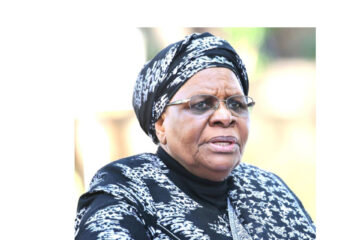Martin Endjala
The trade volumes between Namibia and China will be U$1.3 billion in 2023, with a year-on-year growth of 16.5 percent.
This was revealed by the Chargé d’Affaires of the Chinese Embassy Shen Jian, at the promotion conference of the Seventh China International Import Expo (CIIE) and Hongqiao International Economic Forum held in Windhoek on Tuesday.
According to Jian, China has been the second-largest trading partner of Namibia for many years.
“China welcomes more Namibian products to enter the Chinese market, and the two governments are currently negotiating on the export of Namibia’s deep-sea red crab, abalone, mutton, grape, frozen lobster and others to China.
We are so pleased to see that the economies of China and Namibia highly complement each other and that economic and trade cooperation between the two countries has constantly been deepening,” said Jian.
He said China is a stable export market for Namibia’s minerals such as uranium, lithium and marble, as well as agricultural products such as beef and oysters.
He explained that the partnership was further strengthened in 2018 when Chinese President Xi Jinping and the late President Hage Geingob jointly decided to establish a comprehensive strategic cooperative partnership between the two countries.
The two presidents signed the “Belt and Road” cooperation memorandum of understanding.
In 2023, the two presidents met in Johannesburg, South Africa where they reached a consensus on pushing forward the China-Namibia Comprehensive Strategic Cooperative Partnership.
As a result, China’s electrical equipment, machinery, steel, and garments, have also provided Namibian consumers with a variety of choices with high quality and low price.
Jian emphasised that China has been the largest source of foreign direct investment (FDI) in Namibia for many years, with more than 50 Chinese enterprises having invested or doing business in Namibia, covering the fields of mineral resources development, and civil engineering.
This also includes information and communication, agriculture and husbandry as well as tourism, creating more than 10,000 jobs for the local people.
He pointed out the two major uranium mines of Swakop Uranium and Rössing Uranium run by Chinese nationals, which contribute about seven percent of Namibia’s Gross Domestic Product, and pay about N$1.3 billion taxes to the Namibian government every year
“In the future, we hope to further align the national development plans between the two countries, continuously expand the areas of cooperation, and open up a new era of win-win cooperation and common development in the digital economy, green energy and other areas,” said Jian.
He said China remains committed to promoting high-quality cooperation under the Belt and Road Initiative framework, as well as to negotiating and signing high-standard free trade agreements and investment agreements with more countries.
Meanwhile, the Namibia Investment Promotion and Development Board (NIPDB), extended invitations to Namibia’s business community to participate in the events scheduled for November 2024 in Shanghai, China.
According to the NIPDB, the Business Exhibition will serve as a platform for overseas enterprises to showcase their goods, technologies, and services as well as to facilitate exchange and cooperation among world exports and buyers.
Namibian businesses interested in participating in these events are encouraged to contact the NIPDB.




